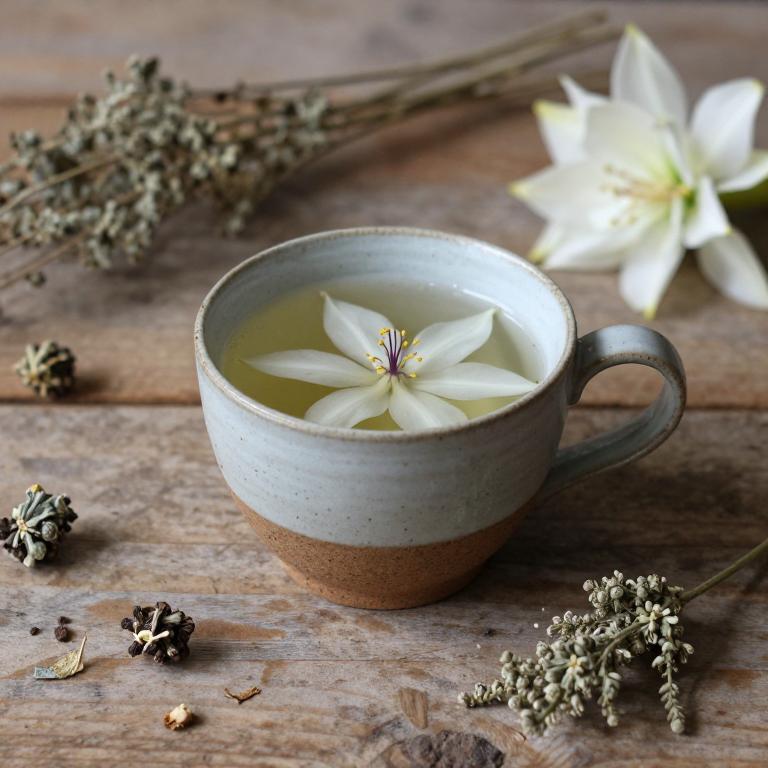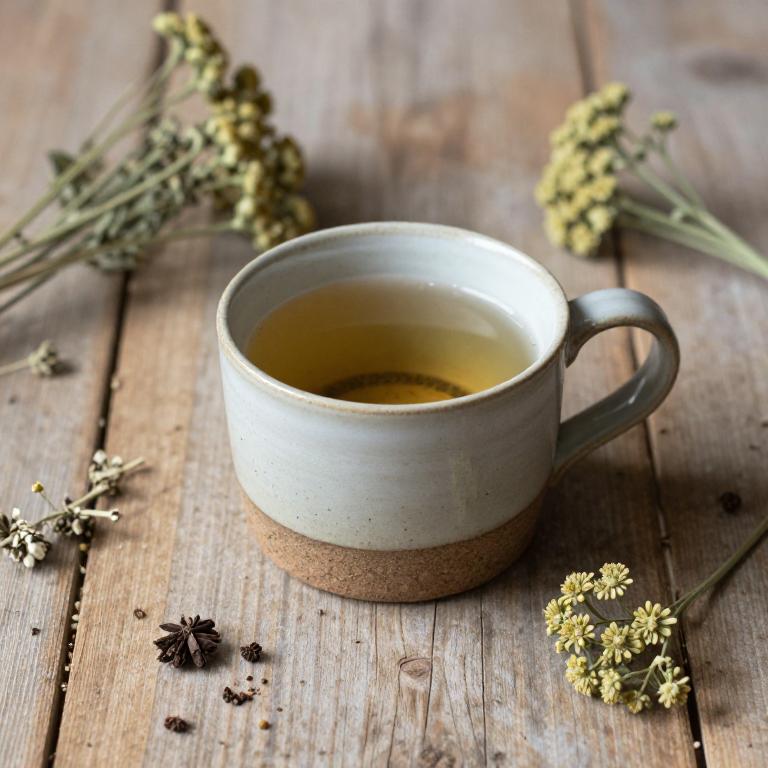10 Best Herbal Teas For Fluid Retention

Herbal teas can be a natural and effective way to help reduce fluid retention by promoting diuresis and supporting the body's natural elimination processes.
Herbs such as dandelion, nettle, and parsley are commonly used in herbal teas for their mild diuretic properties, which can help reduce swelling and bloating. These teas work by encouraging the kidneys to remove excess water and sodium from the body, thereby alleviating symptoms associated with fluid retention. Unlike pharmaceutical diuretics, herbal teas are generally gentler and can be consumed as part of a daily wellness routine.
However, it's important to consult with a healthcare provider before using herbal teas, especially for individuals with pre-existing health conditions or those taking medications.
Table of Contents
- 1. Stinging nettle (Urtica dioica)
- 2. Thistle (Silybum marianum)
- 3. Blessed thistle (Cnicus benedictus)
- 4. White water lily (Nymphaea alba)
- 5. Chaste tree (Vitex agnus-castus)
- 6. Dog rose (Rosa canina)
- 7. Fennel (Foeniculum vulgare)
- 8. Field horsetail (Equisetum arvense)
- 9. Parsley (Petroselinum crispum)
- 10. Common bean (Phaseolus vulgaris)
1. Stinging nettle (Urtica dioica)

Urtica dioica, commonly known as stinging nettle, is a potent herbal remedy often used in teas to address fluid retention.
This plant contains diuretic properties that help increase urine production, thereby reducing excess water buildup in the body. When brewed into a tea, stinging nettle can support the kidneys in eliminating toxins and excess fluids more efficiently. It is particularly beneficial for individuals experiencing mild edema or water retention due to hormonal imbalances or dietary factors.
However, it is important to consult a healthcare professional before using stinging nettle tea, especially for those with kidney conditions or on medication.
2. Thistle (Silybum marianum)

Silybum marianum, also known as milk thistle, is a herbal remedy that has been traditionally used for its potential benefits in supporting liver health.
While it is most commonly associated with liver detoxification, some studies suggest that silybum marianum may also aid in reducing fluid retention by improving overall metabolic function and promoting the elimination of toxins from the body. The active compound, silymarin, is believed to have anti-inflammatory and antioxidant properties that may contribute to its diuretic effects. Herbal teas made from silybum marianum can be a natural alternative for individuals seeking to manage mild fluid retention, though they should not replace medical treatment for severe cases.
As with any herbal supplement, it is advisable to consult a healthcare professional before use, especially for those with pre-existing medical conditions or taking other medications.
3. Blessed thistle (Cnicus benedictus)

Cnicus benedictus, commonly known as blessed thistle, is a herbal remedy traditionally used to support digestion and reduce fluid retention.
This herb is believed to act as a diuretic, helping the body eliminate excess water and toxins through urine. It contains compounds such as sesquiterpene lactones, which may contribute to its effectiveness in managing water retention. Blessed thistle tea is often recommended for individuals experiencing swelling due to hormonal imbalances or dietary factors.
However, it is important to consult a healthcare professional before use, especially for those with existing medical conditions or taking medications.
4. White water lily (Nymphaea alba)

Nymphaea alba, commonly known as white water lily, has been traditionally used in herbal medicine for its potential benefits in reducing fluid retention.
This herb is believed to support the body's natural processes in eliminating excess fluids through its diuretic properties. The active compounds in Nymphaea alba may help improve kidney function, aiding in the removal of water buildup from the tissues. When consumed as a herbal tea, it can be a gentle and natural remedy for mild swelling and edema.
However, it is important to consult with a healthcare professional before using it, especially for individuals with pre-existing medical conditions or those taking medications.
5. Chaste tree (Vitex agnus-castus)

Vitex agnus-castus, commonly known as chasteberry, is often used in herbal teas to support hormonal balance and may help alleviate fluid retention.
This herb is believed to influence the pituitary gland, potentially reducing estrogen levels, which can contribute to water retention. While scientific evidence is limited, many users report reduced bloating and swelling when consuming chasteberry tea regularly. It is typically recommended for women experiencing premenstrual symptoms or hormonal fluctuations.
As with any herbal remedy, it is important to consult a healthcare provider before use, especially for those with existing medical conditions or taking medications.
6. Dog rose (Rosa canina)

Rosa canina, also known as rose hip, is a popular herbal ingredient used in teas to support fluid balance in the body.
This herb is rich in vitamin C, antioxidants, and anti-inflammatory compounds, which can help reduce water retention and promote overall wellness. When consumed as a herbal tea, rose hip is believed to support kidney function, aiding in the elimination of excess fluids. Its diuretic properties may assist in reducing swelling and bloating associated with fluid retention.
As a natural remedy, rosa canina tea is often recommended for individuals experiencing mild edema or water retention issues.
7. Fennel (Foeniculum vulgare)

Foeniculum vulgare, commonly known as fennel, is often used in herbal teas to help alleviate fluid retention due to its diuretic properties.
The seeds of the fennel plant contain compounds like anethol and phellandrene, which are believed to support kidney function and promote the elimination of excess fluids from the body. Drinking fennel tea can help reduce swelling and bloating, making it a popular remedy for those experiencing mild water retention. It is typically prepared by steeping dried fennel seeds in hot water for several minutes, and it can be enjoyed either warm or cool.
However, individuals with certain medical conditions or those taking medications should consult a healthcare provider before using fennel tea as a treatment for fluid retention.
8. Field horsetail (Equisetum arvense)

Equisetum arvense, commonly known as field horsetail, is a herbal remedy traditionally used to address fluid retention due to its high concentration of silica and other minerals.
The plant contains compounds that may help reduce swelling by promoting the elimination of excess fluids through the kidneys and urinary system. When brewed into a tea, equisetum arvense is believed to support diuretic effects, making it a popular choice for those experiencing mild edema or water retention. However, it should be used with caution, as excessive consumption can lead to dehydration or electrolyte imbalances.
It is advisable to consult a healthcare professional before incorporating this herb into a regimen for fluid retention.
9. Parsley (Petroselinum crispum)

Petroselinum crispum, commonly known as parsley, is a versatile herb that has been traditionally used in herbal teas to help alleviate fluid retention.
The herb contains compounds such as apiol and limonene, which are believed to have diuretic properties that aid in reducing water retention in the body. When brewed into a tea, parsley can support kidney function and promote the elimination of excess fluids through urine. Its mild, fresh flavor makes it a pleasant addition to daily herbal tea routines.
Regular consumption of parsley tea may help reduce bloating and support overall fluid balance, making it a natural remedy for those experiencing mild edema or water retention.
10. Common bean (Phaseolus vulgaris)

Phaseolus vulgaris, commonly known as the common bean, has been traditionally used in herbal teas to help manage fluid retention due to its diuretic properties.
The leaves and seeds of this plant contain compounds such as saponins and alkaloids that may promote the excretion of excess fluids from the body. When brewed into a tea, Phaseolus vulgaris can support kidney function and aid in reducing swelling caused by water retention. However, it is important to consult a healthcare professional before using this herb, especially for individuals with pre-existing health conditions or those taking medications.
While some studies suggest potential benefits, more research is needed to fully understand its efficacy and safety in treating fluid retention.